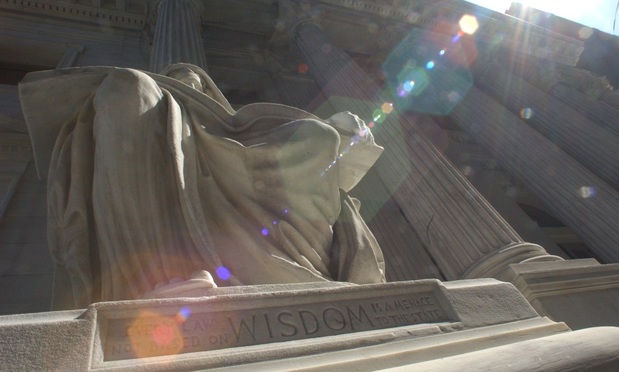David B Saxe

June 15, 2017 | New York Law Journal
Bar Admission Process Holds ValueThe authors of a recent Law Journal commentary, "The Need for Bar Admission Reform," make some worthwhile points but ignore the important work that the various Character and Fitness Committees perform in New York State, as part of the attorney admission process. In particular, they seek to marginalize the interview requirement for all applicants.
By David B. Saxe and Danielle Lesser
6 minute read

April 26, 2017 | New York Law Journal
Streaming of Appellate Arguments at the First DepartmentDavid B. Saxe and Danielle C. Lesser write: The First Department's reluctance to provide the level of transparency other state appellate courts and federal courts in New York provide sets it apart and, given its commercial prominence in resolving high profile disputes, its refusal to provide live streaming is an unfortunate loss for the legal community.
By David B. Saxe and Danielle C. Lesser
12 minute read

April 18, 2017 | New York Law Journal
Making Prenuptial Agreements 'Bulletproof'David B. Saxe writes that no prenuptial agreement is entirely immune from the challenges and vagaries of litigation, but with certain precautions, many of those agreements can be made more invulnerable.
By David B. Saxe
21 minute read

August 29, 2016 | New York Law Journal
A Welcome RespiteOf course all judicial work, at its essence, involves dealing with and resolving conflict between disputing litigants. But, at the appellate level, we also have to deal with and manage conflict in our positions on assigned appeals. Sometimes writings get a bit pointed and sharp. The break of the summertime recess tends to help restore the appropriate level of tranquility necessary to our collegial enterprise.
By David B. Saxe
11 minute read

July 22, 2016 | New York Law Journal
The Under-the-Radar Work of the Appellate DivisionThe work of the First Department includes many types of matters other than the disposition of appeals.
By David B. Saxe
27 minute read

October 01, 2015 | New York Law Journal
My First Wedding CeremonyDavid B. Saxe writes: Some judges are "marrying" judges, that is, they enjoy performing weddings and being part of those often joyous celebratory events. I didn't, for the most part, fall into this group, although when I first became a Civil Court judge, I received calls from time to time from the administrative judge asking whether I would be able to perform a wedding. After saying no a few times, I thought it prudent to answer in the affirmative lest my future part assignments take an unpleasant turn.
By David B. Saxe
5 minute read

September 30, 2015 | New York Law Journal
My First Wedding CeremonyDavid B. Saxe writes: Some judges are "marrying" judges, that is, they enjoy performing weddings and being part of those often joyous celebratory events. I didn't, for the most part, fall into this group, although when I first became a Civil Court judge, I received calls from time to time from the administrative judge asking whether I would be able to perform a wedding. After saying no a few times, I thought it prudent to answer in the affirmative lest my future part assignments take an unpleasant turn.
By David B. Saxe
5 minute read

April 29, 2015 | New York Law Journal
Tips for New JudgesDavid B. Saxe offers advice for those in the infancy of their judicial careers.
By David B. Saxe
5 minute read

April 28, 2015 | New York Law Journal
Tips for New JudgesDavid B. Saxe offers advice for those in the infancy of their judicial careers.
By David B. Saxe
5 minute read

March 12, 2015 | New York Law Journal
The Amorphous Concept of Finality in CPLR 5501 JurisprudenceDavid B. Saxe discusses a procedural issue that can lead to possible pitfalls: When a pretrial order grants summary judgment in favor of some of the defendants, may the plaintiff wait until the appeal from the final judgment to challenge that order, and may the Appellate Division treat that order as brought up for review in the plaintiff's appeal from the final judgment after trial, dismissing the complaint in its entirety?
By David B. Saxe
11 minute read
Trending Stories
- 1The Law Firm Disrupted: Playing the Talent Game to Win
- 2A&O Shearman Adopts 3-Level Lockstep Pay Model Amid Shift to All-Equity Partnership
- 3Preparing Your Law Firm for 2025: Smart Ways to Embrace AI & Other Technologies
- 4BD Settles Thousands of Bard Hernia Mesh Lawsuits
- 5A RICO Surge Is Underway: Here's How the Allstate Push Might Play Out
More from ALM
- Morgan & Morgan Class Action Attorneys Detail Pathway to Success Within Cybersecurity and Data Privacy Practice 1 minute read
- Holwell Shuster & Goldberg Partners Leverage 'Hostile' Witnesses to Secure $101 Million Verdict Against Walmart 1 minute read
- Legal Speak at General Counsel Conference Midwest 2024: Mike Andolina, Partner, White & Case 1 minute read



